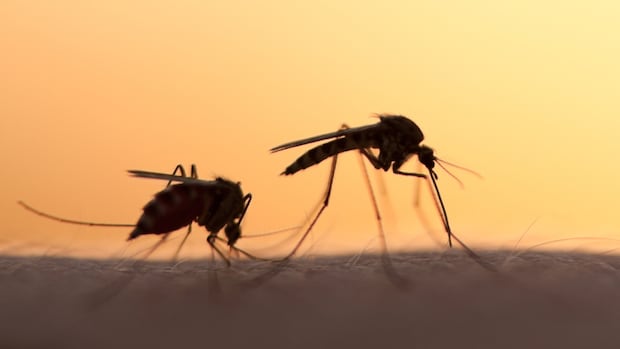With some Prince Edward Islanders saying mosquitoes seem especially bad this summer, despite the unusually dry conditions, an entomologist says climate change is partly to blame.
Christine Noronha, a research scientist with Agriculture and Agri-Food Canada, said recent warm weather has slowed down the growth of some mosquito species on P.E.I. but sped up the propagation of others.
“Insects love heat. So when it’s really nice and warm, they thrive better in this — except if it goes up a certain threshold. Then after that, they don’t like it as much,” Noronha told CBC’s Island Morning.
Island MorningMosquitoes are all the buzz this summer
Mosquitoes seem to be out of control this summer in some parts of the Island, even with the dry weather. Entomologist Christine Noronha explains why.
She said this past winter’s milder temperatures have also contributed to higher mosquito numbers. Typically, prolonged freezing conditions help kill off eggs and larvae.
“The winter hasn’t been really cold, so we don’t get that mortality as a result. You have a lot more mosquitoes then,” she said.
How weather shapes different species
Noronha said Prince Edward Island is home to 33 mosquito species.
Some are univoltine, meaning they produce only one generation a year. Others can have several generations in a single season.
She noted that multivoltine species often rely on small pools of water for breeding.
“The weather right now would affect the ones that are multi-generational, because we don’t have… enough little pools of water here and there,” she said.
 There are 33 species of mosquitoes on Prince Edward Island, out of the 3,500 species found around the world. (mycteria/Shutterstock)
There are 33 species of mosquitoes on Prince Edward Island, out of the 3,500 species found around the world. (mycteria/Shutterstock)
However, salt-marsh mosquitoes, which breed in coastal wetlands, can continue reproducing regardless of rainfall.
When temperatures climb to around 30 C, mosquitoes can develop much faster, Noronha said.
In cold weather, it can take two weeks to progress through the larval stage. In warm weather, that can happen in as little as three or four days.
“That’s a rapid turnaround,” she said. “And multi-generational ones, they turn around really fast.”
Mosquito bites
Noronha said some mosquito species target mammals and birds, while others are more aggressive toward humans.
Female mosquitoes bite because they need blood in order to produce and nurture their eggs, using its proteins and nutrients for that purpose.
“As they put their proboscis into your vein to suck blood, they also introduce saliva, and that saliva has an anticoagulant, so your blood doesn’t coagulate and become thick, so it remains thin, so that they can suck it all up,” Noronha said.
“So your body reacts to that, saying, ‘Oh, well, foreign substance’… It sends its immune system to that, and that’s why you start to itch and it swells up.”
Noronha added that some days this summer have been particularly humid, which mosquitoes like, so people are more likely to notice them out and biting.
She said the time of day also matters. Some species are active at dawn or dusk, while others are more active during the day.

